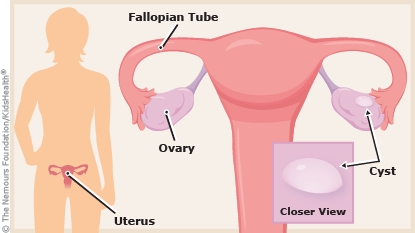Ovarian Cyst: Caring for Yourself
An ovarian cyst is a fluid-filled sac that forms on or in an ovary. Depending on your age, the size and type of cyst, and whether the cyst is causing belly pain or other problems, the health care provider may recommend:
-
watching to see if the cyst goes away on its own (often, cysts go away without treatment within a month or two)
-
treatment with birth control pills (to prevent new cysts from forming)
-
surgery (to remove the cyst)
It doesn't happen very often, but an ovarian cyst can burst (rupture), bleed, or lead to a twisting of the ovary (ovarian torsion). These are serious medical problems that need to be treated right away.



You have new or worse belly pain, have trouble peeing, are peeing more often than usual, or have irregular periods.

You have:
-
Sudden, severe pain in the lower belly with or without nausea and vomiting. This can be a sign that the ovary has twisted or burst. It needs medical treatment right away.
-
A hard, tender belly. This can be a sign that the cyst bled into the belly.

Who gets ovarian cysts? Females of any age can get ovarian cysts. They're more likely to happen in those who have:
-
endometriosis (when tissue that normally lines the uterus grows outside of the uterus)
-
a pelvic infection
-
had ovarian cysts in the past
-
polycystic ovary syndrome (a hormone problem that causes irregular or missed periods)
What type of cysts can happen in teens? The most common type of ovarian cysts in teens are related to the menstrual cycle (periods). The ovary releases an egg each month. The egg builds a sac around itself called a follicle. If the egg is not released (no ovulation), the follicle can keep growing and form an ovarian cyst (called a follicular cyst).
What problems can ovarian cysts cause? They can lead to:
-
pain or fullness in the belly
-
irregular periods
-
trouble peeing or peeing more often than usual
-
ovarian torsion or rupture
-
bleeding into the cyst